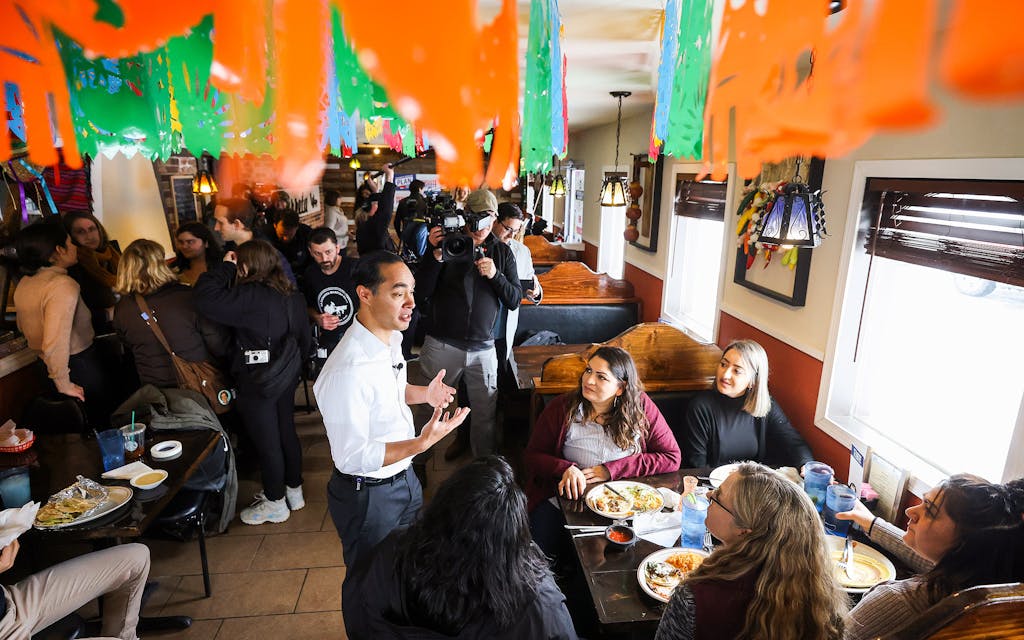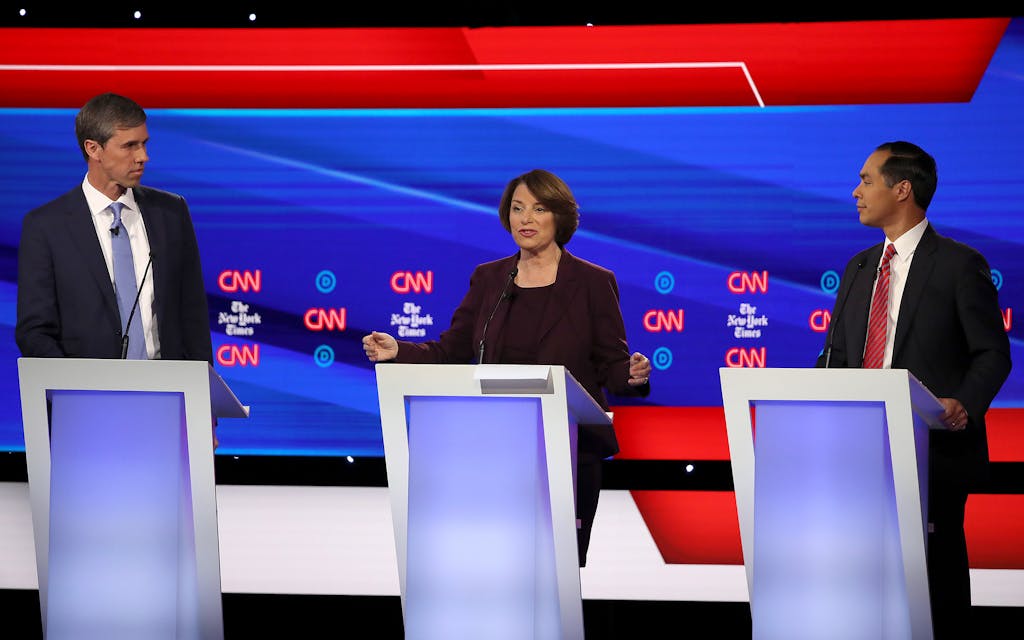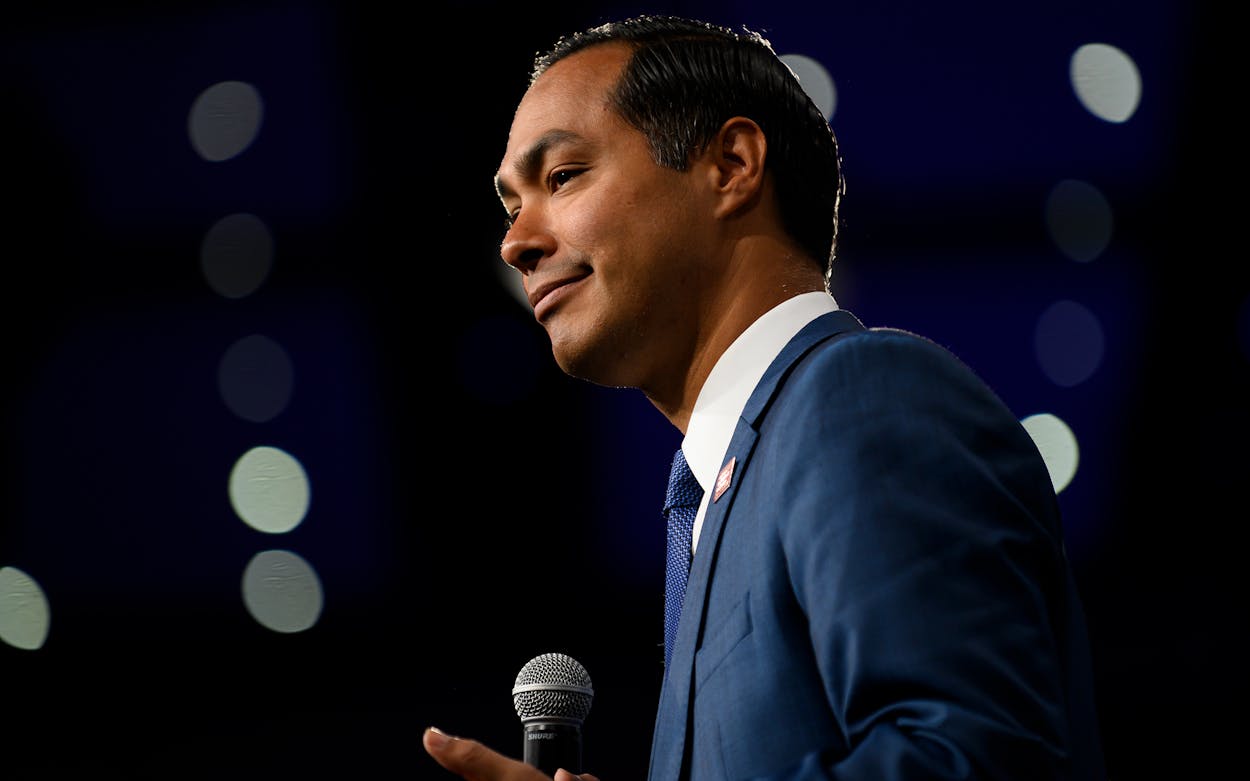In the summer of 2013, Julián Castro, then the mayor of San Antonio, and his twin brother Joaquin, a first-term member of Congress, appeared on the cover of Texas Monthly. Standing between them was Wendy Davis, then a state senator from Fort Worth. “Game On?” asked the headline, raising the question of which Democrat could break a then twenty-year run of losses for the party in every statewide race.
At the time of the issue, Julián Castro had already said he would sit out the 2014 gubernatorial race, explaining that the state was “still some time away” from electing a Democrat and he still had more to do as mayor. Castro recalled recently on his podcast, Our America, that as he was making up his mind about running, former Houston mayor Bill White, who ran and lost for governor against Rick Perry two years into Barack Obama’s first term, told him it would be tough to win as a Democrat in a midterm. Indeed, fresh off her eleven-hour filibuster of anti-abortion legislation that excited Democrats in Texas and across the nation, Davis ran and got trounced by twenty percentage points by then attorney general Greg Abbott.
As it came to pass, both Castros would have futures in politics, but neither has sought statewide office in Texas. For years Joaquin eyed a 2018 challenge to Senator Ted Cruz. He ultimately passed, deferring to Beto O’Rourke, the El Paso congressman who entered the House the same time as Joaquin but, at the time of the Texas Monthly cover, had not been on anybody’s list as the next big thing in Texas politics. Joaquin also passed on challenging Senator John Cornyn in 2020. Meanwhile, Julián sought to avoid the pitfalls of being a Democrat in Texas altogether. In 2014, he stepped down as mayor to go to Washington to serve as Secretary of Housing and Urban Development, a position he held through the end of Obama’s term. He then announced a bid for the Democratic presidential nomination in 2019, along with O’Rourke, but both fell off the ballot before the first votes were cast.
Since that race, many have wondered whether Julián Castro or Beto O’Rourke would challenge Abbott’s reelection in 2022. Castro chose instead to sign on as a political analyst with NBC News and MSNBC. O’Rourke announced his candidacy last week.
Texas Monthly reached Castro in San Antonio, where he lives with his wife and two children, to talk about his future political ambitions, O’Rourke’s candidacy, and the GOP’s inroads with Hispanic voters in South Texas in 2020. This interview has been lightly edited for length and clarity.
Texas Monthly: At 47, you and your brother are two years younger than Beto O’Rourke. You three are the Democratic stars of your generation of Texas politics, and, as such, there has been some inevitable rivalry and your ambitions have bumped against one another’s. After Joaquin deferred to O’Rourke in the Cruz race in 2018, did you expect that O’Rourke would defer to you when you ran for president in 2019?
Julián Castro: By the end of his 2018 campaign, we could see that it was a possibility that he may well run in 2020, so it wasn’t completely out of the blue.
TM: If O’Rourke had made it clear early on that he wasn’t going to run for governor this cycle, would you have felt some obligation to?
JC: I considered it very early on, but it just didn’t feel like the right time. And so I made my own decision well before Beto announced his plans. It was really unlikely that I would have run either way in 2022. I feel like I just ran this marathon [for president] in 2019 and 2020, and I’m enjoying what I’m doing right now. I’ll likely jump back into it, but not in 2022.
TM: Jump back in as a statewide candidate, or as a presidential candidate?
JC: I think that’s still to be determined.

TM: It’s been more than 25 years since a Democrat won statewide office in Texas. Do Democratic candidates here have to be prepared to lose a race or two before winning?
JC: For sure. Beto has demonstrated that you don’t have to prevail to win. He came out of 2018 elevated. And I believe that’s going to help him in 2022. And, you know, there may come a day when I run statewide, but 2022 just didn’t feel like the right time.
TM: Midterms are typically bad for the party with the presidency, and Joe Biden has very low approval ratings in Texas. But you’ve said that O’Rourke also has some potential advantages running against Abbott and his record. What are they?
JC: I believe it’s a mistake to underestimate two things. First, to underestimate the GOP primary challenge to Greg Abbott from Allen West and Don Huffines. And secondly, to underestimate Beto’s chance of pulling off an upset.
On the primary challenge, there’s still a lot of time. Allen West has the kind of combination of charisma and extremism and track record that appeals to the Republican party of today. And in the general election, people see Republican leadership in Texas as the face of failure. Failure on COVID, failure on keeping Texans safe during the winter, keeping kids safe in school. And voters clearly want change. That may hurt Democrats in some places, but I believe it’s going to hurt Republicans in Texas. So Republicans are in a weaker position in Texas than they might otherwise be.
TM: Have you been surprised by Abbott’s hard Trumpian turn—pledging to finish Trump’s border wall, and at the former president’s insistence, pursuing an audit of the 2020 election in Texas, even though there is no dispute about the result?
JC: Abbott is so frightened of losing his primary that he has sold his soul to Donald Trump. I hope Texans get that by the end of the ’22 campaign, because there are a lot of Texans that may still think that he’s this reasonable, pro-business, pro-growth candidate like George W. Bush or Rick Perry. He’s not. He’s whatever he needs to be to get reelected. And what he needs to be to get reelected in the 2022 Republican primary is an extremist.
I fully expect that once the general election comes around he’s going to try and move over to the middle a little bit, go to pachangas [fundraising parties] in El Paso and San Antonio and play a reasonable, moderate Republican a little more, or a lot more than he is now.
TM: Beto O’Rourke is the lone serious candidate for the top of the Democratic ticket. State representative Michelle Beckley, Mike Collier, and Matthew Dowd are the candidates competing to be the party’s nominee for lieutenant governor. All are non-Hispanic and white, and there’s no certainty that there will be a Black or Hispanic or Asian candidate further down the statewide ballot. Are you concerned that the Democratic ticket in 2022 won’t reflect the diversity of its voters?
JC: I would love for us to field a very diverse ticket in 2022, and I believe that there will be a diverse ticket. If there’s not as diverse a ticket as we want, I don’t think that will reflect a lack of support for Democrats from Black, Latino, and Asian American Texans. The Texas Democratic Party’s policies and politics much better represent a diverse Texas than the Republican party does. It doesn’t matter how many George P. Bushes or others they put up; their policies are terrible for most people of color in this state, and most Texans really, regardless of their color, but especially vulnerable communities of color. [Bush’s mother, Columba, is Mexican American.]
TM: Perhaps the most surprising news coming out of the presidential election in 2020 was Trump’s gains with Hispanic voters, especially in South Texas. Zapata County, which didn’t even have a local Republican party, went for Trump; in Starr County, which Hillary Clinton won by sixty points in 2016, Biden only won by five. And the same day that O’Rourke announced for governor, Abbott and House Speaker Dade Phelan joined state representative Ryan Guillen of Rio Grande City at a press conference at which Guillen switched parties to become a Republican. How worrisome is that?
JC: Those things do happen. I expect you’re gonna see a steady stream of Republicans becoming Democrats in the years to come, especially in suburban communities. We know Biden closed the overall gap in Texas to five and a half points in 2020, when Clinton had lost by nine here in 2016 and Obama by sixteen in 2012. As long as Abbott is parroting Trump, and if Trump is running again in 2024, I expect that movement to the left to continue in those suburban communities. [On October 19, FiveThirtyEight published an analysis in which it calculated that Biden added around 416,000 net votes from 2016 to 2020 from the Austin, Dallas–Fort Worth, Houston, and San Antonio metropolitan areas, while Trump’s gains in South Texas produced only 89,000 more net votes.]
TM: What do Texas Democrats need to do to fortify their standing in South Texas?
JC: Democrats need to organize. They need to be clear about what they’re delivering for the people that they represent or seek to represent, and need to be clear about the differences between Democrats and Republicans. Only Democrats are working so that everybody in the state can prosper regardless of your background. Only Democrats are standing up for everybody’s right to get a good education in our state. And only Democrats are trying to make sure that everybody’s right to vote is protected.
We also need to recruit very compelling candidates to run down there. The hard truth is that for generations, South Texas was shortchanged, first by Democrats and now by Republicans. And we should be honest about that. What we need to do is we need to provide a vision for investing and uplifting South Texas in a very meaningful way. But it’s hard for Democrats in Texas because we don’t control any of the levers of government.
TM: One of the problems Democrats face in the Rio Grande Valley is that they have been so dominant for so long that all that mattered were the primaries, and local Democratic powers that be had little incentive to expand the electorate.
JC: You get a lot of local politicians, especially on county commissioners’ courts, who really have been sitting on their hands, not expanding access to the franchise, and that was before these draconian bills. [In September, Abbott signed into law SB 1, a Republican legislative effort to impose further restrictions on voting.]
I saw that here in San Antonio. It could have done a lot more over the years to make the franchise more convenient to exercise and bring more people into the fold. You remember that Secretary of State’s analysis a few years ago that said that only 20 percent of school districts were requesting the forms to get eligible high schoolers registered to vote even though they’re supposed to do that under state law? [A Texas law enacted in 1985 requires that every high school in the state distribute voter registration applications to eligible students at least twice a school year. An analysis by the Texas Civil Rights Project found that only 14 percent of schools took the first step toward compliance in time for the 2016 election. By the 2019–20 school year that figure had risen to 38 percent.]
TM: Both you and O’Rourke have criticized the Biden administration for its continued use of Title 42, a public health provision invoked by the Trump administration to turn away asylum seekers amid the pandemic that was recently used to deport more than seven thousand Haitians in September. O’Rourke has also criticized Biden for not making the border a more urgent priority. Is that the right approach in Texas?
JC: I took note of Beto’s criticism of the administration on Title 42, which I believe is correct. So far, in his nascent campaign, Beto has handled the immigration issue very well. The problem is that immigration doesn’t lend itself to a reasonable, levelheaded conversation in American politics. Republicans are going to call him an open-borders guy either way.

TM: During your presidential campaign you were credited with moving the Democratic candidates on immigration policy, specifically toward support for decriminalizing illegal border crossings. Do you think that’s had a lasting impact, or that after nearly a year of the Biden administration and Democratic trepidation about immigration, you’re starting from scratch again?
JC: I think I and others worked to humanize people who are seeking a better life in the United States in the face of Trump’s cruelty. I wanted to point out that we should not lose our own humanity by treating migrants as nonhuman. And in that sense, I do think that it raised awareness. Like any issue, I recognize that there’s going to be compromise in terms of policy. I would be happy at this point if we’re able to make some good progress on immigration, so that people are not living in limbo, afraid of deportation, that Dreamers [undocumented individuals who came to the U.S. when under the age of sixteen] can continue making America an even better nation, and we bring some order to what has been a chaotic system, especially since Trump turned it over.
TM: Hasn’t a softer line on immigration been a particularly hard sell in some border communities?
JC: Border communities are most directly impacted by what happens at the border, by nature. So it’s understandable that people, no matter who they are, are going to be concerned about what’s going on in their backyard. Their everyday quality of life is more affected by the policies coming out of Austin and D.C. on immigration. I understand their concerns. And I believe we need to provide many more resources to those border communities to deal with the influx of people.
At the same time immigration is an issue of national concern that stretches far beyond the physical geography of that border. And we need to treat it that way. I also believe that the vast majority of people who live along the border are good-hearted. They do have sympathy for people who are seeking a better life here. They just want to make sure that things are done in an orderly way, and that their quality of life is thought about and protected as well. That’s what everybody wants.
TM: Are you liking life on the other side of the microphone?
JC: I’m enjoying it. I’m having a good time. When I went off to college, I thought I was going to go into broadcast journalism. And this is about as close as I’m ever going to get. I think I’m too far off the beaten path now to really ever go into two professions that keep themselves very consciously apart. But I always have a lot of fun following politics and talking about it and thinking about it.
- More About:
- Politics & Policy
- Julian Castro
- Greg Abbott
- Beto O'Rourke






